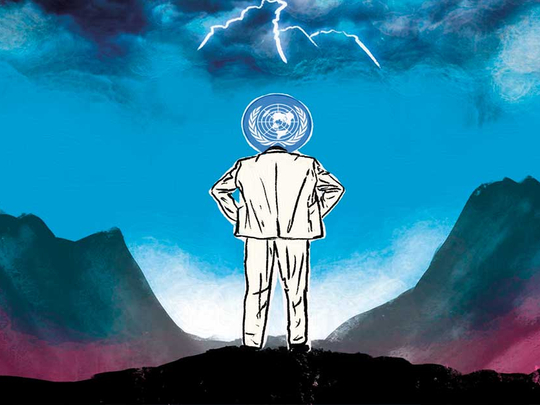
Since it was founded in 1945, the United Nations has brought together all nations irrespective of their cultural, ethnic and religious backgrounds. Over the past 75 years, the member states of the UN have strived to maintain its international structure, contribute to its general budget and defend its body. As people try to write off its importance in the world, it is no exaggeration that without the UN, the world might turn out to be a different place where the weak increasingly become prey of the strong. The existence of the UN marks the dividing line between civilisation and barbarism, progress and backwardness, and between light and darkness.
In this backdrop anyone, with an iota of human decency and imagination, will seek to defend the house of nations and peoples. Since its inception, many calls were made, demanding change in the Charter of the United Nations and making it better, because in circa 2018 it has begun to lost some of its sheen — it is outdated and needs to be upgraded to meet the requirements of the times and aspirations of nations. However, these calls have faded over time after they were met by strong resistance to change and modernisation. Despite the pressure of modernisation and changing its charter, the UN maintains its functions within the framework of the same charter.
Many people inside and outside the UN are convinced that revising the charter is a bold, sound and essential decision. This will unavoidably diminish the margin of mistakes in its performance, especially when it comes to dealing with issues of nations and peoples. The change is key because not evolving may have a negative impact on generations to come.
Undoubtedly, the UN is the world’s sole constitutional house that brings together all nations and peoples under its unified umbrella. However, the UN performance in some aspects constitute a source of concern to a number of its members, which are respected by the international community.
The UN’s failure — or helplessness — to stem the misery in Yemen during recent years is a case in point. The national Yemeni army and popular residence have caught some UN staff dealing with Al Houthi militias through food aid carriers, which transport aid to Al Houthis, instead of delivering the aid to eligible Yemenis. In turn, Al Houthis sell portions of food aid in the open market to make a quick buck. Moreover, the same vehicles, which are used in transporting aid, are used to deliver different weapons to Al Houthi military locations. Is this action, now documented, a sort of involvement by some of the UN staff?
In another example, the UN sent millions to Yemen to finance a de-mining project. Al Houthis misappropriated the funds and fabricated a story that the funds were embezzled by a member of Al Houthi, in a personal and isolated incident, to cover up the theft. This incident raises a question about how the UN sends money to Al Houthis to remove landmines that are planted by the same people in the first place.
Failed to set a plan
In a third incident, all UN envoys to Yemen, since the eruption of the crisis, have failed to take a single step towards finding a solution in accordance with UN resolutions, GCC initiatives or outcomes of the National Yemeni dialogue. None of them succeeded in developing an innovative approach to help arrive at a compromise or reach common ground to solve the crisis. They all failed to set a plan leading to a consensual political solution between all parties involved after disarming them. They could not stop hooliganism practised by Al Houthi gangs and thugs against innocent civilians.
The UN insists on the delivery of humanitarian aid to Yemen through the Al Houthi-held Red Sea port of Hodeidah, despite knowledge that Al Houthi militias may loot humanitarian assistance. It knows for sure that the port of Aden, which is well prepared and equipped with modern wharves can ensure the delivery of aid to Yemenis in need. The Saudi-led Arab coalition, which launched Operation Restoring Hope to support the legitimacy government, has repeatedly asked the UN to use the port of Aden for delivery of aid.
One does not want to believe that UN envoys cause havoc wherever they go. The Serbian war, Kosovo massacre from February 1998-June 1999, and the Rwanda massacre, which happened in April 1994, give some examples of how the UN handle such crises. While it is an important world body, the UN needs to evolve and act prudently as it goes ahead.
Mohammad Hassan Al Harbi is a renowned columnist and author whose writings cover various fields ranging from media studies to education.











